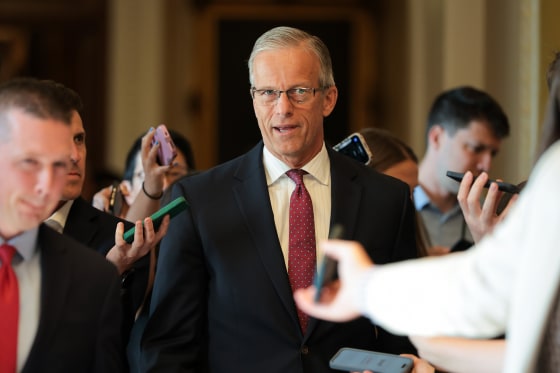WASHINGTON — The Senate bill’s Medicaid cuts are too aggressive for politically vulnerable Republicans.
Its clean energy funding cuts are too tame for conservative House Republicans, who are threatening to sink the legislation.
And the $10,000 cap on state and local tax deductions, or SALT, is a nonstarter for key blue-state House Republicans.
The GOP-led Congress is barreling toward its own deadline to pass the “One Big Beautiful Bill Act,” and it’s getting messy in the final stretch as President Donald Trump ramps up the pressure on lawmakers to put it on his desk by July 4.
“To my friends in the Senate, lock yourself in a room if you must, don’t go home, and GET THE DEAL DONE THIS WEEK,” Trump wrote Tuesday on Truth Social. “Work with the House so they can pick it up, and pass it, IMMEDIATELY. NO ONE GOES ON VACATION UNTIL IT’S DONE.”
Passing the party-line bill through the House and the Senate, where Republicans have three votes to spare in each chamber, will be a daunting task that requires bridging acrimonious divides. The toughest part will be settling on a final product that can unify Senate GOP moderates, like Susan Collins of Maine and Lisa Murkowski of Alaska, with the far-right House Freedom Caucus. Those two factions have tended to drive the hardest bargain.
After a conference lunch meeting, Senate Majority Leader John Thune, R-S.D., told reporters the Senate’s goal is to get the bill “across the finish line by the end of the week,” with the goal of crafting a package that can win 51 votes.
“Hopefully when push comes to shove and everybody has to say yes or no, we’ll get the number of votes we need,” he said.
A significant source of consternation is the steeper Medicaid cuts in the Senate bill, which include lowering provider taxes that are used to fund the program, and limiting payments to states.
Sen. Thom Tillis, R-N.C., who faces re-election in a battleground state next year, warned his party at a meeting Tuesday that it will lose the 2026 midterm elections if it pushes ahead on proposed Medicaid cuts. He compared the situation to the heavy losses Democrats suffered in the 2014 midterms after a rocky Obamacare rollout, according to a source in the room.
Tillis circulated a document Monday with estimates of how much Medicaid money states would lose if the Senate bill passes, including $38.9 billion in losses for North Carolina, $16 billion for Tennessee and $6.1 billion for Missouri.
Sen. Josh Hawley, R-Mo., said the current version of the bill — which would also extend the 2017 Trump tax cuts — doesn’t have enough votes and would harm rural hospitals in his state.
“Senate leadership now needs to fix this. They’re the ones who have invented this new rural hospital defund scheme that the House says they can’t pass, that’s going to close rural hospitals,” he said. “It was a bad idea on their part to fool around with it.”
Republicans are looking at creating a fund to protect rural hospitals from the negative consequences of their bill. Sen. Bill Cassidy, R-La., said only a small proportion of Medicaid funds go to those institutions, but he argued that “having a fund specifically for rural hospitals is a targeted way to help ensure their viability.”
Senate GOP leaders want to include the Medicaid cuts to limit the bill’s red ink. The nonpartisan Congressional Budget Office projects that the version the House passed would add $2.4 trillion to the debt over the next 10 years.
On Tuesday, 16 House Republicans — almost all representing competitive districts — sent a letter rebelling against the Senate’s Medicaid cuts. They fretted that those policies would “place additional burdens on hospitals,” among other things.
“Protecting Medicaid is essential for the vulnerable constituents we were elected to represent. Therefore, we cannot support a final bill that threatens access the coverage or jeopardizes the stability of our hospitals and providers,” wrote the House Republicans, led by David Valadao of California, whose district has one of the highest shares of Medicaid recipients in the country.
Democratic Congressional Campaign Committee spokesperson Justin Chermol responded to the letter quickly, questioning the sincerity of the Republicans' opposition to Medicaid cuts.




